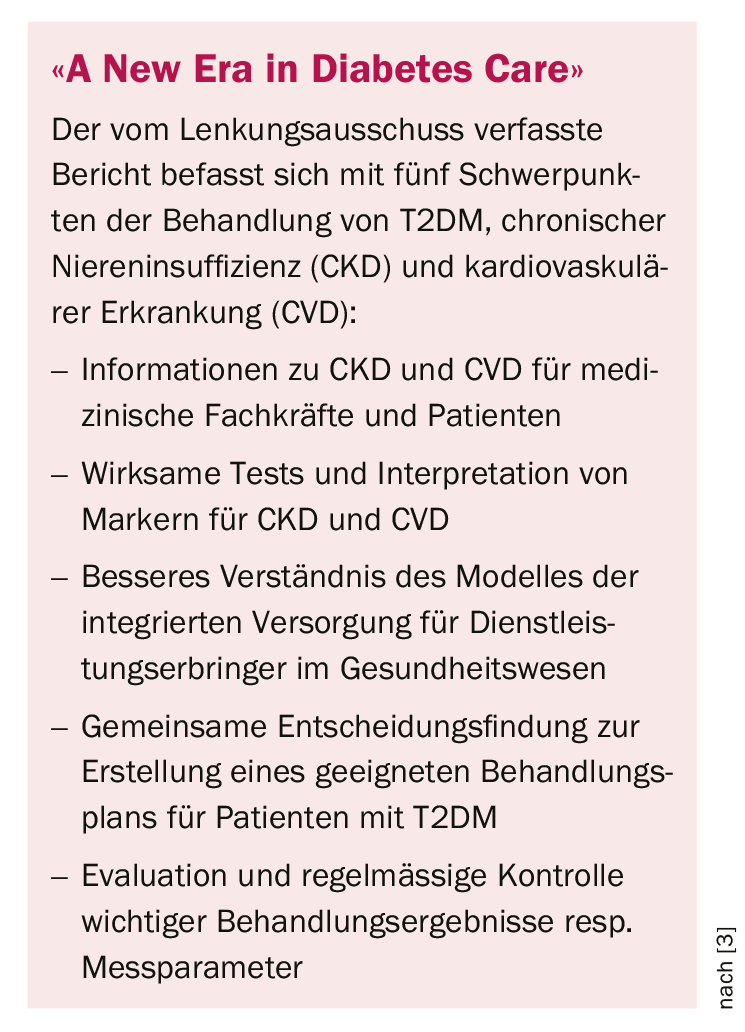The recently published expert panel report outlines strategies to optimize treatment for individuals with type 2 diabetes mellitus. Special attention is given to the issue of cardiovascular and renal sequelae.
The A New Era in Diabetes Care initiative is a collaboration of eight diabetes professionals. “The aim of the project is to highlight challenges and inequalities in the prevention, monitoring, and treatment of type 2 diabetes mellitus (T2DM) and its associated complications in Europe, with a particular focus on renal failure and cardiovascular sequelae,” explained Professor David Wheeler, Chair of the Steering Committee and Professor of Renal Medicine at University College London (UK) and Honorary Consultant Nephrologist at the Royal Free NHS Foundation Trust, London (UK) during a virtual panel discussion on June 4, 2020 [1]. The recently published expert report contains recommendations for action for physicians in primary and secondary care to close gaps in care for the approximately 53 million T2DM patients in Europe [2] (box). The document is available for download from this homepage [3]: www.dcvd.org

Raise awareness of cardiorenal sequelae.
The complications associated with type 2 diabetes, such as chronic renal failure and cardiovascular impairment, are a major burden on patients and the healthcare system. In the context of the increase in the prevalence of T2DM in Europe, this topic has a particularly high topicality and relevance. If the progression of chronic renal failure can be treated and slowed down, the risk of cardiovascular disease, the most common cause of death in these patients, is also reduced. The expert report stresses the importance of physicians screening patients early and prophylactically for chronic renal failure, treating appropriately, and reviewing outcomes regularly to prevent the development of serious complications. In the context of COVID-19, maintaining annual screening for CKD is suggested (subject to safeguards) as well as, if appropriate, use of telemedicine in the management of T2DM patients in general.
That there are gaps in the general population’s knowledge about diabetes is shown by the results of a survey conducted as part of the project [3]: Of the 9143 adult participants in eight European countries, almost half did not know that there are two main types of diabetes (type 1 and type 2), and the vast majority were unaware that 9 out of 10 diabetics are affected by type 2 diabetes. When asked about the most serious complications of T2DM, only one-third of respondents selected chronic kidney failure (CKD), and less than half selected cardiovascular disease (CVD), despite being two of the leading causes of death in this patient population [4–6].
The expert report also includes a summary of various European patient education and outreach initiatives aimed at raising awareness about diabetes, cardiorenal complications, and adequate treatment options [1,3]. Some examples of such projects are TREND-UK (“Training Research and Education for Nurses in Diabetes”) [7], PCDE (“Primary Care Diabetes Europe”) [8], and ANODE (e-coaching program) [9].
Source: Mundipharma
Literature:
- “A New Era in Diabetes Care,” virtual panel discussion, 6/4/2020.
- IDF Diabetes Atlas Ninth Edition 2019, www.diabetesatlas.org
- Expert Report: A New Era in Diabetes Care, www.dcvd.org
- Einarson T, et al: Cardiovasc Diabetol 2018; 17(1): 83.
- Tuttle K, et al: Diabetes Care 2014; 37(10): 2864-2883.
- Mundipharma International Limited General Public Diabetes Awareness Survey. Conducted by Research Without Barriers, April 15-27, 2020.
- TREND-UK, Training Research and Education for Nurses in Diabetes, https://trend-uk.org/
- PCDE, Primary Care Diabetes Europe, www.pcdeurope.org
- Hansel B, et al: J Med Internet Res 2017; 19(11): e360. doi: 10.2196/jmir.7947.
CARDIOVASC 2020; 19(2): 33
FAMILY PRACTICE 2020: 15(7): 49











